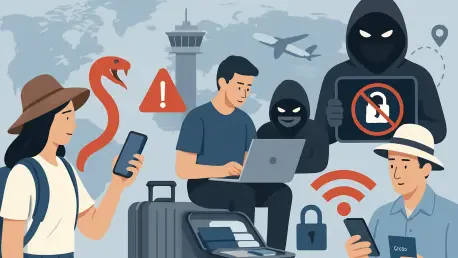The travel industry in the United States, encompassing airlines, hotels, and travel agencies, finds itself under an unrelenting siege from cybercriminals who exploit the sector’s digital vulnerabilities and high transaction values. As bookings and transactions increasingly shift online, the stakes have never been higher, with fraudsters employing ever more sophisticated tactics to infiltrate systems and siphon funds. Reports from key industry players reveal a landscape where progress in certain security measures is overshadowed by a persistent rise in fraudulent activities. This alarming trend demands attention, as the sector remains among the top targets for cybercrime, grappling with everything from stolen credit card data to deceptive partnership scams. The urgency to adapt and fortify defenses against these evolving threats has become a critical priority for stakeholders across the board.
Emerging Threats in the Travel Sector
Sophisticated Fraud Tactics on the Rise
The ingenuity of cybercriminals targeting the travel industry has reached new heights, with tactics becoming increasingly complex and harder to detect. Fraudsters are no longer relying solely on traditional phishing emails; they now mimic legitimate online travel agencies to steal sensitive credit card information and peddle discounted bookings on the dark web, often bolstered by fake online reviews to build credibility. Techniques such as aligning IP addresses with departure locations and focusing on last-minute bookings to dodge chargebacks demonstrate a calculated approach to evasion. A particularly insidious scheme involves proposing fraudulent partnerships to agencies, promising lucrative fees for ticket issuance authority only to disappear with the money. One notable case saw an agency lose a staggering $1 million to such a deception, highlighting the devastating financial impact of these ploys. The need for rigorous vetting and a healthy dose of skepticism toward seemingly attractive offers cannot be overstated as these scams continue to proliferate.
Escalating Fraud Rates Across Segments
Data from recent analyses paints a grim picture of fraud rates within the travel sector, with airlines and hotels bearing the brunt of the attacks. In the airline industry, fraudulent sales have surged to nearly 2.5 times the baseline across other sectors, while hotels face incidents at a rate 112% above the industry average. Global figures further underscore this crisis, showing fraud rates for flight and train bookings at 98% above the norm, and hotel transactions exceeding the baseline by 49%. Through the first half of the current year, reports indicate a 9% uptick in airline fraud incidents and an 8% rise in hotel-related fraud, reflecting relentless pressure on these businesses. These statistics reveal a stark reality: despite targeted efforts to curb specific vulnerabilities, the overall volume of fraudulent activity continues to climb. This persistent escalation signals an urgent call for enhanced security protocols to safeguard against the financial and reputational damage inflicted by these crimes.
Strategies to Combat Cybercrime
Progress Through Security Measures
Amid the rising tide of cyber threats, some progress has been made through strategic interventions by industry bodies. The implementation of multifactor authentication and mandatory cybersecurity training for accredited agencies has yielded tangible results, notably a 50% reduction in unauthorized ticketing incidents year-to-date. These measures represent a significant step forward in securing agency environments against specific risks that have long plagued the sector. However, while such initiatives have curbed certain types of fraud, the broader landscape of cybercrime continues to evolve, often outpacing these defenses. The reduction in unauthorized ticketing stands as a testament to the effectiveness of proactive policies, yet it also highlights the limitations of focusing on singular issues when the spectrum of threats is so vast. Continuous adaptation and expansion of security frameworks are essential to address the multifaceted nature of fraud that persists in targeting airlines, hotels, and travel agencies with alarming frequency.
Building Resilience Against Future Risks
Looking ahead, the travel industry must prioritize building resilience through a combination of advanced technology and heightened awareness to stay ahead of cybercriminals. Beyond existing measures like multifactor authentication, there is a pressing need for comprehensive education programs that equip staff with the skills to recognize and respond to emerging threats such as phishing schemes and account takeovers. Thorough due diligence when engaging with potential partners can prevent devastating losses from deceptive scams that promise quick profits. Additionally, leveraging data analytics and fraud detection tools can help identify suspicious patterns before they result in significant damage. The inherent attractiveness of the travel sector to fraudsters—due to high order values, digital product delivery, and global demand—necessitates a proactive stance. By fostering a culture of vigilance and investing in cutting-edge security solutions, the industry can better position itself to mitigate risks and protect both financial assets and customer trust in an increasingly hostile digital environment.









